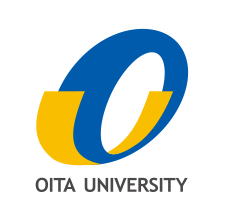研究室配属 Research Training
◆2023年の研究室配属 |
 |
| NEWS! 2023年5月8日 研究室配属が始まりました。 今年は、3名の学生が研究に取り組みます。伊藤さんは早期研究学生として既に1年以上前から当講座で研究を進めています。上野さんは、一般枠で5月から研究をスタートします。また、小原くんは外部施設研究学生として国立がん研究センターで研究します。 今年も大分大学の協定校であるタイのマヒドン大学医学部から短期留学生2名(Nath君とAtsukiさん)が、既に4月4日-5月8日まで配属しました。さらに、5月13日から新たに協定校になったタイのマッハサラカーム大学の短期留学生3名も配属します。 5月5日、WHOはCOVID-19について「国際的に懸念される公衆衛生上の緊急事態」の宣言を終了すると発表し、日本でも5月8日より2類から5類感染症に緩和されました。しかし、SARS-CoV2が消えたわけではないので、感染防止を心がけて楽しくやりましょう!! |
| 配属学生 氏名 | 研究テーマ | コメント |
|---|---|---|
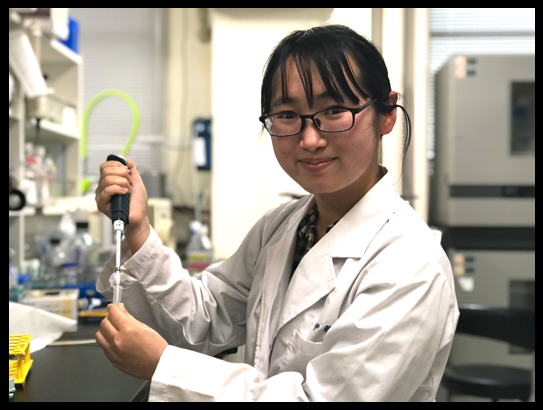 2041010 伊藤 夏希 |
● 乾癬の病態におけるケモカインの機能解析 指導教員:小林、Ekronarongchai 自己免疫疾患である乾癬の増悪因子として炎症性サイトカインIL-17が報告されている。IL-17を産生する細胞サブセットはいくつかあるが、それらの炎症局所への遊走には種々のケモカインが関与していると予想される。CRISPR-Cas9システムを用いて様々なケモカイン遺伝子欠損マウスを樹立し、これらマウスで乾癬モデルを作製することで、乾癬の病態に重要なケモカインの機能を解析する。 技術:マウス乾癬モデル、PCR法、病理学的解析、免疫染色、フローサイトメトリー 【感想】今回の研究室配属を通して、多くのことを学ぶことができました。 まず、研究における実験を正確に行うことの難しさです。例えば、PCR法においてサンプルと試薬やプライマーを混ぜる段階で、一つでも濃度や量を間違えると、本来とはかけ離れた結果になったり、データが得られなくなったりしました。データの正確性は、実験の手技が安定して確立されていることが前提とされていることを感じました。さらに、一つ一つの工程や試薬などが果たす役割について理解しながら行うことが重要だと思いました。 また、研究結果の再現性についてです。一度の実験、またn数が少ない実験で得られたデータは、マウスの個体差や、試薬などの条件、先程述べさせていただいたような手技的な要因で、二回目以降の実験、n数を増やした実験で変化しうるということです。だからこそ、一回の実験で得られたデータを鵜呑みにせず、何回も繰り返して再現性を得ることが大切なことを学びました。 最後に、得られたデータからの考察についてです。私はこれが一番楽しくも、難しくも感じました。【右欄へ続く】 |
【一言】配属期間中、日中の多くの時間を実験等に費やせることを嬉しく思います。発表会まで実験の手技をはじめデータの解釈の仕方など多くのことを学ばせていただきたい所存です。よろしくお願い致します。 |
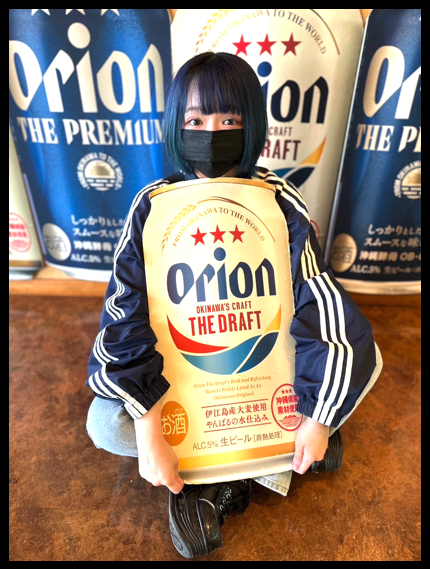 2041013 上野 真愛 |
● トキソプラズマの新たな病原性分子の探索 指導教員:神山 トキソプラズマはトキソプラズマ症の原因となる原虫であり、特に妊婦が初感染した場合、子供に重篤な症状が起きる可能性がある。CRISPR-Cas9システムを用いて様々な遺伝子欠損トキソプラズマ株を作製する。これらをマウスへ感染させることで、病原性を規定する新規分子の探索を行い、新しいトキソプラズマ症の治療法についての可能性を考察する。 技術:CRISPR-Cas9、PCR法、マウス感染実験、病理学的解析、免疫染色 |
【感想】3ヶ月に満たない短い期間でしたが、様々な分析方法や手技、データの扱い方を教えていただきありがとうございました。今まで卒業後は漠然と臨床医になることを考えていましたが、この研究期間を通じて研究医への道を考え始めました。大阪大学の微生物研究所での経験も自分にとって研究医に興味を持つきっかけとなる非常に貴重な経験になりました。研究期間は7/21で一旦終わりですが、今後もこの研究を続けていきたいと考えています。先天性トキソプラズマ症の予防法の開発に貢献できるように頑張りたいです。 |
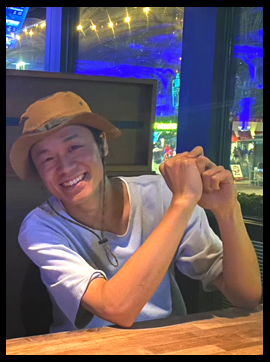 2041102 小原 直人 2041102 小原 直人 |
● 固形癌の腫瘍微小環境の網羅的な免疫プロファイリング |
【一言】約3ヶ月間、研究に打ち込みます! 【感想の続き】そのため、私の基礎研究、トランスレーショナルリサーチ(TR)や臨床での経験を活かせる機会、例えば研究に興味がある学生がいれば私自身の経験や知識を還元していきたいと思っております。 最後になりましたが、研究室配属期間がなければこのような機会を得ることは難しかったため、関係者の皆様に対して感謝を申し上げるとともに、特に今回学外にて研究をする機会をくださった、国立がん研究センターの西川博嘉先生や小山正平先生、大分大学の窓口担当を受け入れてくださった、小林隆志先生に深謝いたします。 |
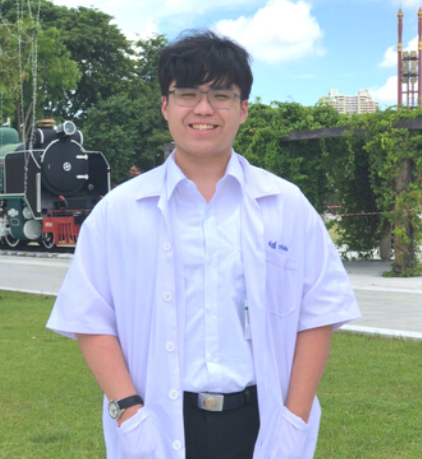 Nath Wareewanich |
● 乾癬の病態におけるケモカインの機能解析 ● Role of chemokines in the pathogenesis of psoriasis Supervisor: Ekronarongchai and Kobayashi Nath-kun is a second-year medical student, Faculty of Medicine, Siriraj Hospital Mahidol University. He has learned qPCR technique to measure cytokines and chemokines in a mouse model of psoriasis. He also learned Flow cytometry and ELISA techniques. 【comments 1】 During my time at Oita University, I had the opportunity to work with many talented researchers in Kobayashi-sensei's lab. I am very grateful for their kindness and helpfulness during my stay. Our study’s focus was on the pathway of psoriasis in humans using mouse samples. It was fascinating to learn about the complexities of this disease and to find the possibility to utilize this knowledge. During my three-week stay, Nan-san provided me with invaluable guidance on laboratory techniques such as qPCR, ELISA, and flow cytometry. Her advice helped me to develop my skills and gain confidence in the lab. (to be continued) |
【comments 2】 Apart from the research, the area around Oita University was a peaceful place to live in. The city center was also energetic and modern, offering a wide range of shops and restaurants. One of my best memories in Oita was trying Kare-udon, a delicious dish that quickly became my favorite. Overall, my experience doing research at Oita University was both challenging and enjoyable. I am grateful for the opportunity to work with such talented researchers and to learn so much about the research process. Although I will miss the food and atmosphere of Oita, I am excited to bring back the skills and knowledge I gained during my stay to Thailand. Thank you everyone at the lab, I will miss all of you and Oita! |
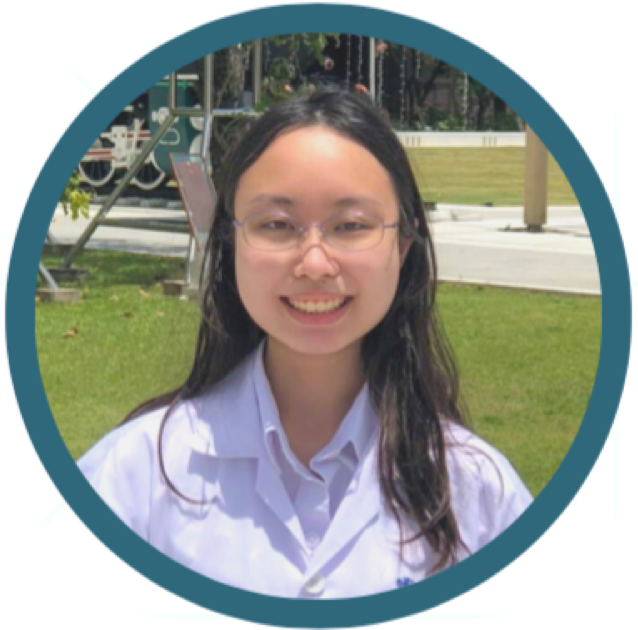 Atsuki Matsuzawa |
● 遺伝子改変ゼブラフィッシュを用いたMSG9の機能解析 ● Analysis of the MSG9 gene using genetically modified zebrafish Supervisor: H. Shiraishi and T. Hanada Atsuki-san is a second-year medical student, Faculty of Medicine, Siriraj Hospital Mahidol University. She has analyzed the role of MSG9 gene using genetically modified zebrafish. She has learned the basic technique of genome editing in zebrafish usign a CRISPR/Cas9 system. 【comments 1】 During my one-month research training at Oita University's Department of Cell Biology, I worked with zebrafish and learned valuable techniques such as the use of Cas9 protein and guide RNA to induce targeted mutations, as well as PCR, Western blotting, and CoIP. These techniques enabled us to study the role of specific genes and proteins in zebrafish development, leading to potential insights into human biology and new treatments for human diseases. Overall, the experience was rewarding and provided me with useful skills and knowledge for my medical career. |
【comments 2】 I would like to express my heartfelt gratitude to the professors and colleagues at Oita University's Department of Cell Biology for their warm and friendly support during my research training. Their guidance and expertise were invaluable in helping me learn new techniques and deepen my understanding of biology. Beyond the academic benefits, the friendly and welcoming atmosphere at Oita University made my time there a truly memorable experience. I will always cherish the memories and friendships made during my stay in Oita, and I will miss the community dearly. |
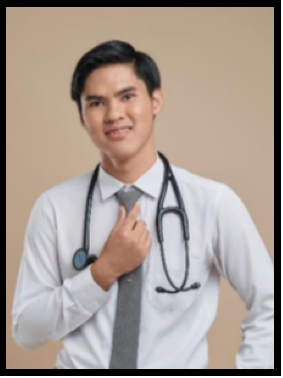 Thanaphat Phupanna (Pote) |
【comments】 I was fascinated and impressed during the research training program at the Department of Infectious Disease Control, Faculty of Medicine, Oita University, for one month. I had the opportunity to learn how to work in the laboratory for research. Our study focuses on toxoplasmosis, the infectious disease that severely affects humans and animals. We were studying how to prevent and control the severity of the disease. Although this study focuses on the effect on humans, it’s also zoonosis disease. I am interested in studying how to cut the cycle by vaccination in animals in the future. I worked and learned how to handle and restrain laboratory mice. I learned and practiced how to genotyping via PCR technique. I learned many techniques such as B-cells collecting, protein assay method, western bloating, Vero cells culturing, serum collecting, flow cytometry, and ELISA. Overall, it was hard at first, but everyone was kind to help and gave me infinite knowledge, so it was a precious time in my life working and learning with them. The knowledge and experiences received from this program were more than I expected. I will apply what I’ve learned in my veterinary study and try harder to improve myself. | 【comments】 I would learn how to work in laboratory processes for research. This exchange program is a wonderful opportunity for me to practice laboratory skills and exchange culture. |
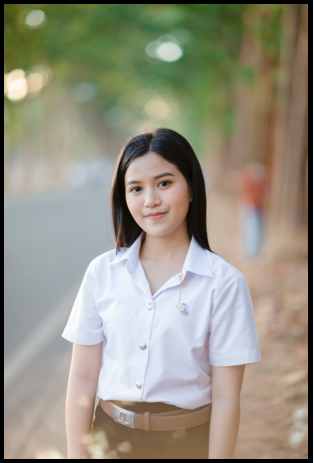 Thanitaporn Nonsri (Bambam) |
In this one-month research training, I was part of the department of Neurophysiology, under the supervision of Reiko Hanada-sensei. I worked with zebrafish, mainly practiced on the use of zebrafish as a model study from the very beginning of the Transgene process: Fish Aquaculture, Fish Mating, Plasmid DNA Purification, Microinjection. In this lab, I observed the works of four talented researchers, Umeda-san, who has studied the cognitive behavior of zebrafish in response to ethanol, which is a rare experiment. I practiced statistical analysis of experimental results. Phurpa-san, who studied heart failure zebrafish model induced by isoproterenol and verapamil. I observed culture of transformed E.coli, restriction digestion of plasmid, fish heart rate monitoring. Shan-san, who studied inflammatory intestine model induced by LPS and DSS. I observed fish fixation for histopathology. Besides, I learned how to prepare Half Karnovsky’s Fixative, Tissue collection for Genotyping and observed fluorescence imaging of neural activity from Magdeline-san. I have learned a lot of useful things that I can apply in my career in the future. Due to my thirst for learning, I practiced restraining and collecting blood samples from laboratory mice, doing tissue collection for genotyping of mice and PCR with Eve-san, who instructed and allowed me the opportunities to do them myself. Also, I practiced preparing skin and spleen collection for Flow cytometry from Nan-san. Without the help of Natsuki Matsuno-san, the lab’s secretary, I would have been struggling through this time. She facilitated me in many ways such as taking me to create an ID for connecting to the internet, lending me a laptop to use when I could not connected to the internet, and helping me get into Japanese class. I really appreciate that. |
【comments】 I would learn about working in the advance laboratory, especially at the Faculty of Medicine, Oita University, where is academic readiness and advancement. This exchange program is a very special and rare opportunity that if I could reach it even just once would be enough to enhance my few experience and knowledge. It will also be a blazing fire that will guide my vision a hundred times wider. |
 Thanyathon Uthaiwattana (Ing) |
The first time I came to Oita University, I was really excited. I had the great opportunity to work with people who were talented and specialized in each department. For nearly one month, I have been training in the Department of Cell Biology. Our study focuses on zebrafish. Using zebrafish as a prototype has valuable benefits for both humans and animals because their genes and organs are similar to humans; they used to analyze and study gene mutations for future medical use I have learned important techniques that are useful for my veterinary career, such as PCR, DNA cloning, HE stain, and flow cytometry. In addition to my laboratory experience, I have met people who were sincere and kind to me while living here. I would like to thank you all for your support and encouragement. It means a lot to me. This experience I can't find anywhere else. Words cannot express how grateful I am for the professors and Oita University. This place will keep a lot of memories for me. | 【comments】 I would like learning and improving my skill about laboratory. I would like to apply and work as a veterinary intern and I will bring all of my knowledge and skills to the research 's benefits as much as i can. This exchange program is a wonderful opportunity for me to improve my skill and international cultural exchange. |
Nath-kun and Atsuki-san, second year medical students at Siriraj Hospital Mahidol University, Thailand, have joined us. They participate in our program of research training. Nath-kun studied on autoimmune diseases using mouse models in our lab and Atsuki-san studied neurodegenerative diseases using zebrafish models in T. Hanada's lab. |
||
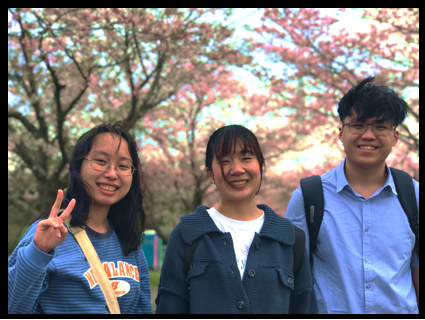 |
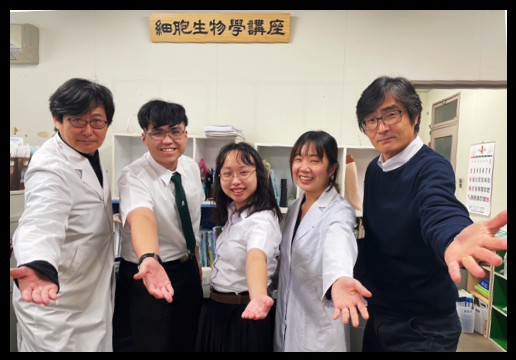 |
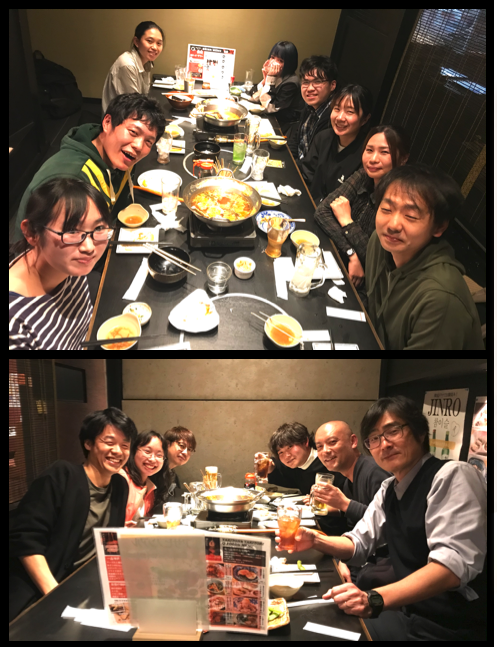 |
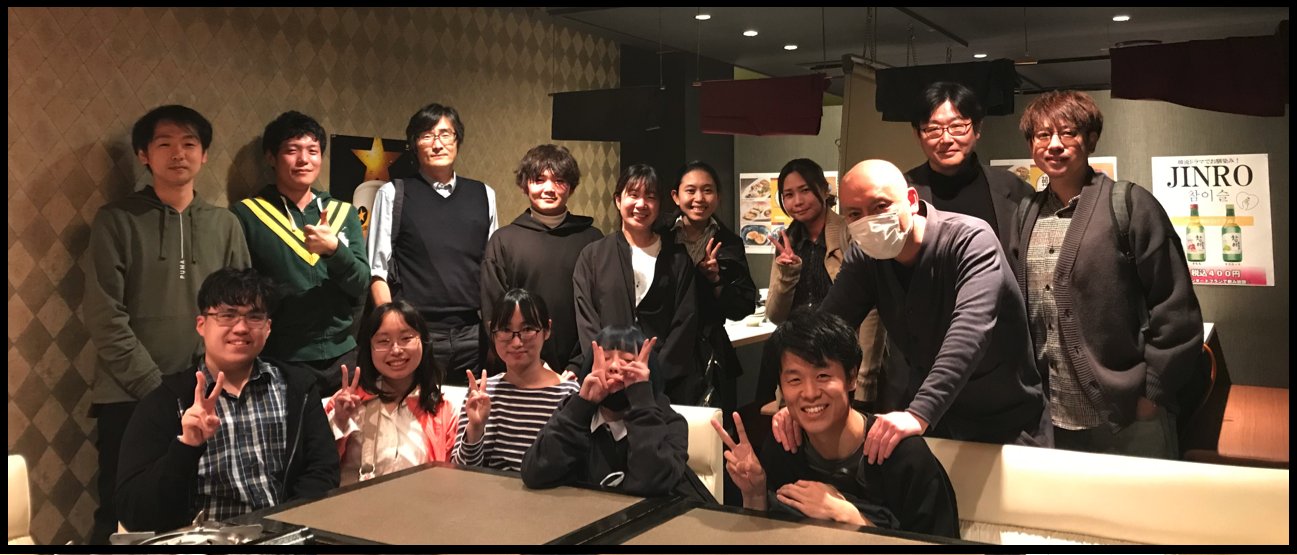 |
||
April 4: The first day in Oita, in front of cherry blossoms (upper left). April 9: At Dept Cell Biol with Prof. T. Hanada (upper middle). April 13: Welcome dinner (right and bottom) |
||
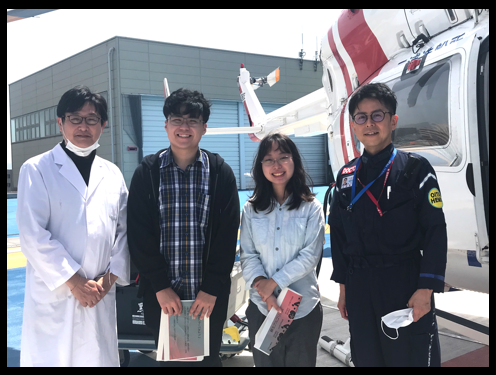 |
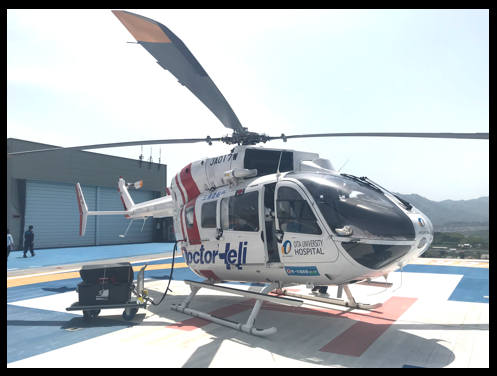 |
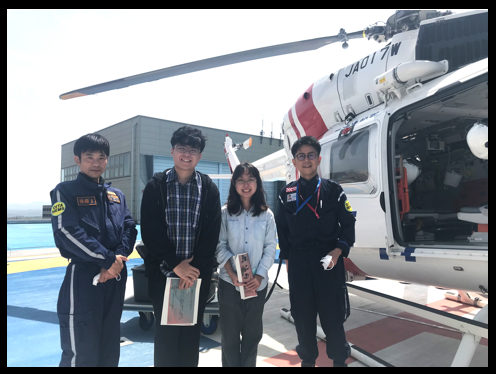 |
April 18: They visited the Department of Emergency and Critical Care Medicine, where they were briefed by Professor Abe on how to operate the Doc Helicopter. |
||
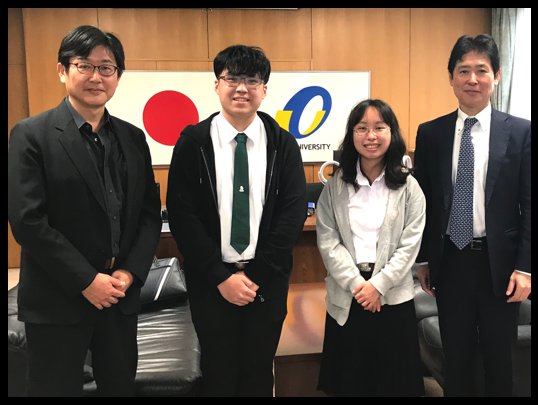 |
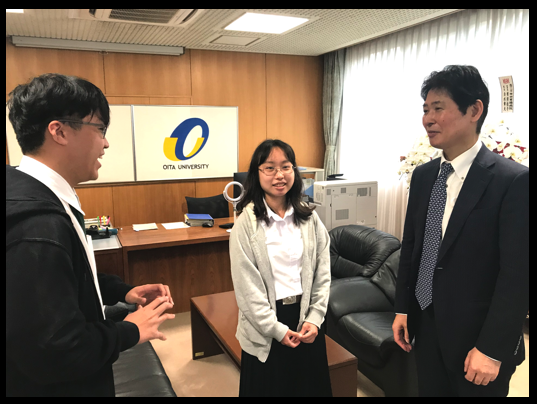 |
April 25: Mr. Nath and Ms. Atsuki made a courtesy call on the Dean of the Faculty of Medicine, Prof. Inomata. |
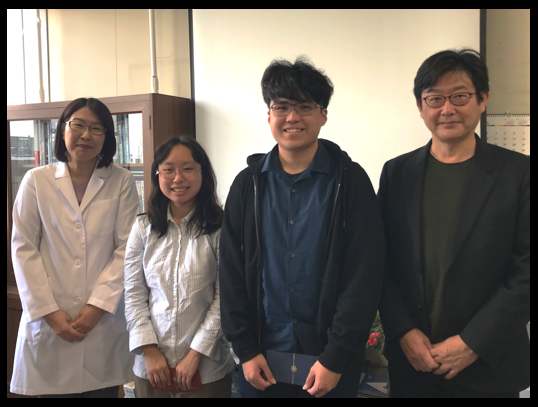 |
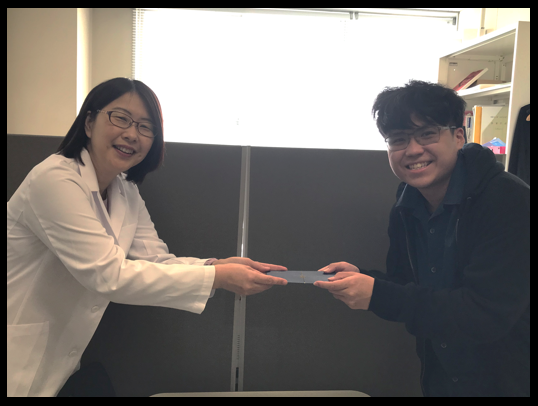 |
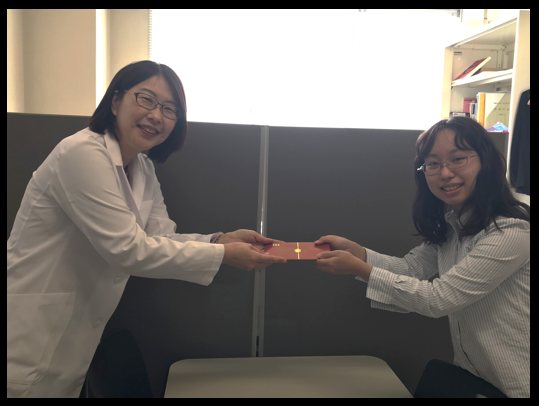 |
| April 28: Mr. Nath and Ms. Atsuki were awarded the Study Abroad Encouragement Award by the Oita University Faculty of Medicine International Exchange Committee, and the award ceremony was held on April 28th. The award was presented by Prof. Reiko Hanada, Chair of the committee. This award is given to students from Mahidol University and other partner universities who participate in research training at Oita University. | ||
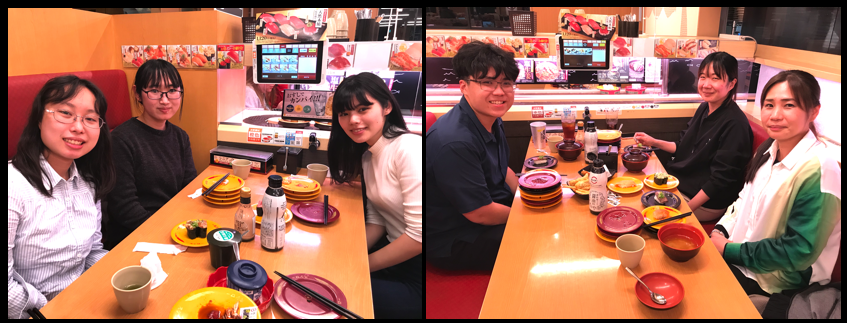 |
スケジュール |
April 28: Sushiro |
|
 |
|
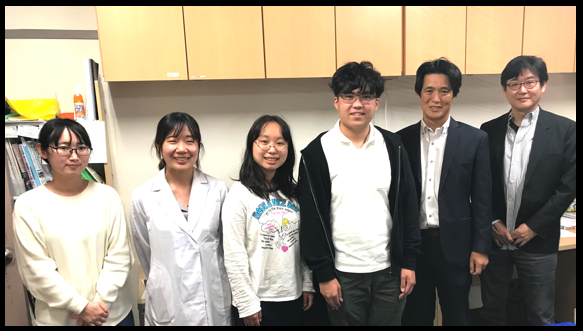 |
May 8th: Mr. Nath and Ms. Atsuki have completed the program. Congratulations! |
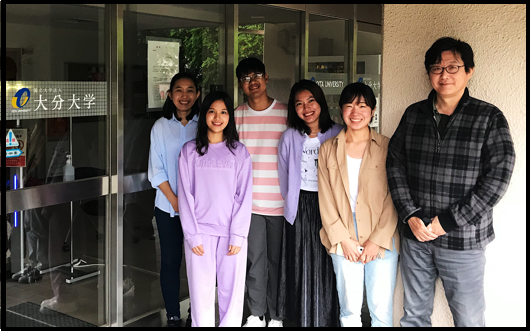 |
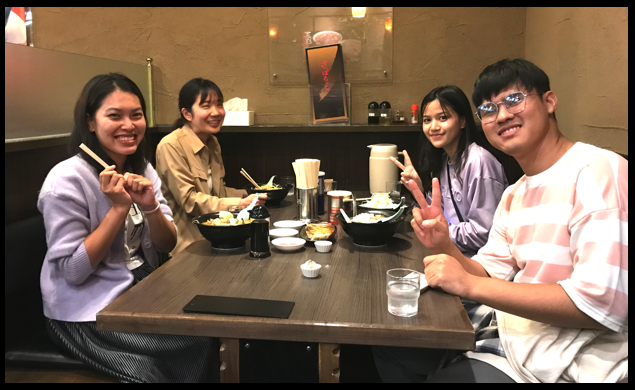 |
| May 13th: Pote-kun, Bambam-san and Ing-san, third year students at Mahasarakham University(MSU), Thailand, have joined us. They participate in our program of research training. |
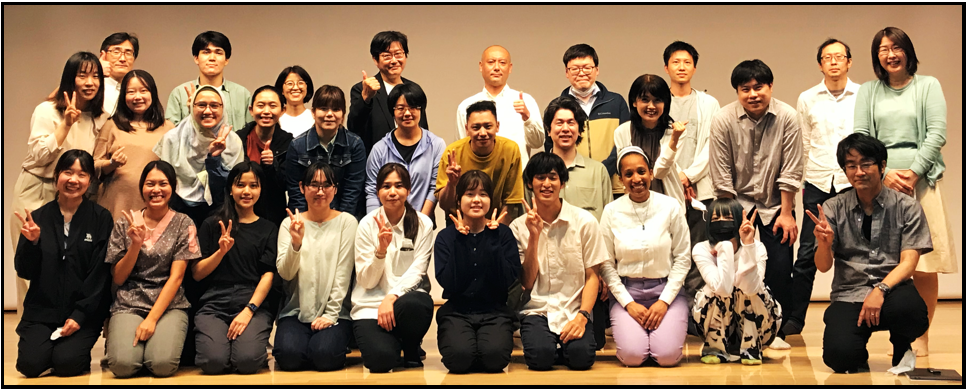 |
||
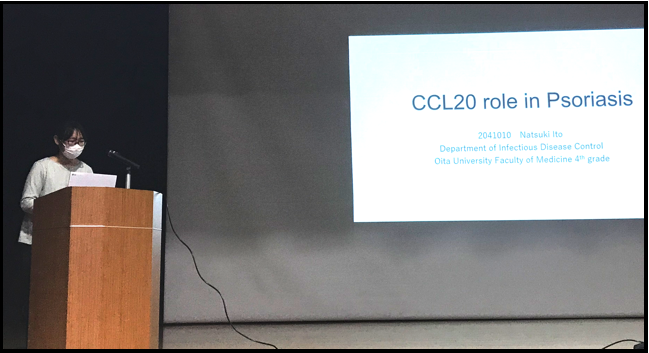 |
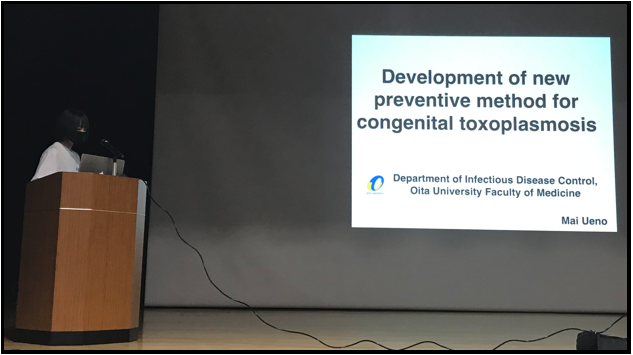 |
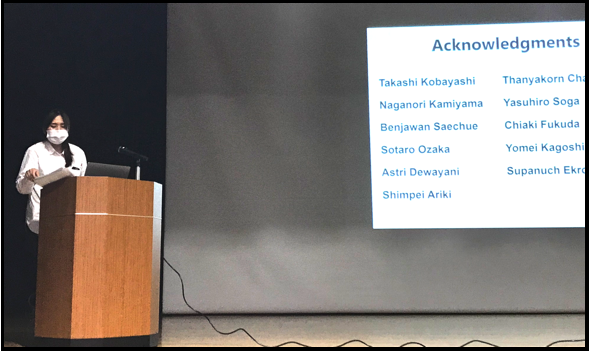 |
| May 18: Joint Seminar We held a joint seminar wiht Toshi Hanada and Reiko Hanada Labs at the Shonai Public Hall in Yufu city. Ms Ito (left), Ms Ueno (Middle) and Ms Sachi (Right) presented their research data in English. |
||
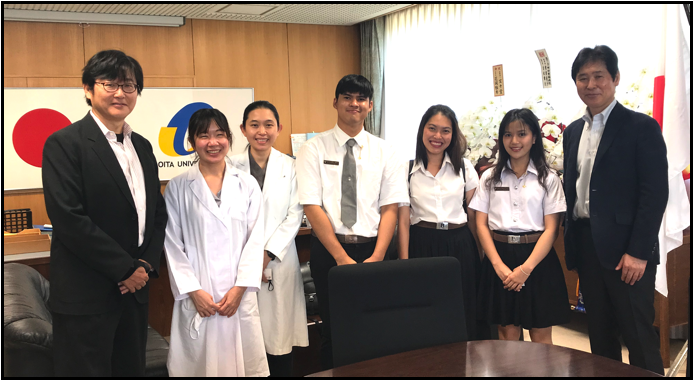 |
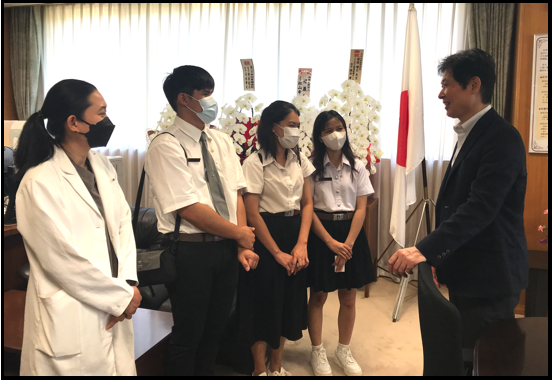 |
| May 24: Mr. Pote, Ms. Bambam and Ms. Ing made a courtesy call on the Dean of the Faculty of Medicine, Prof. Inomata. | |
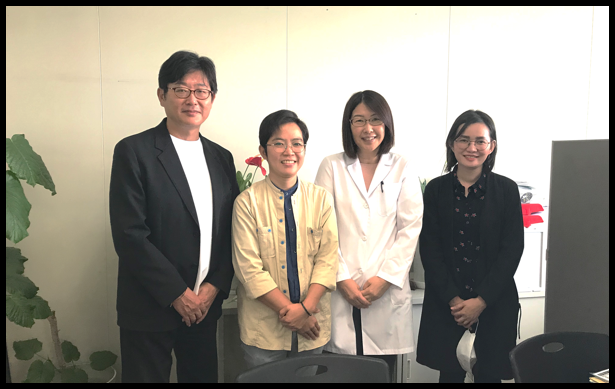 |
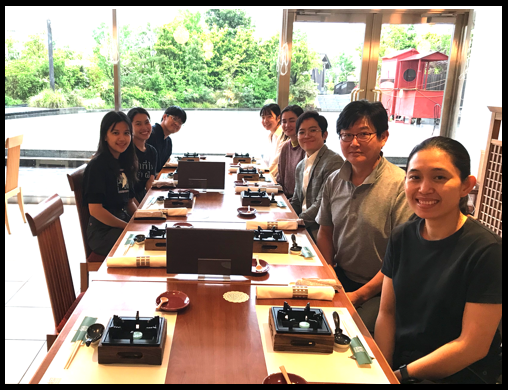 |
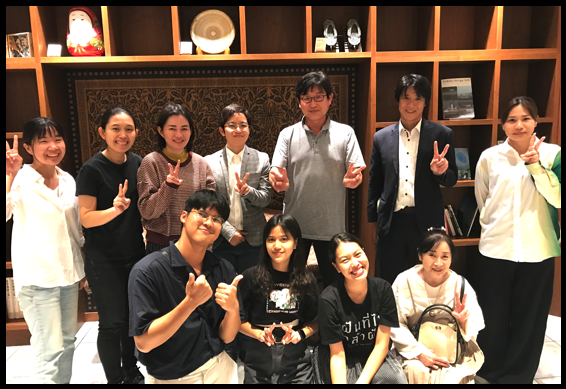 |
June 6: Dr. Surangkanang Chaiyasak and Dr. Kanissarinn Sakundech, mentors of students from MSU, visited Oita University. We discussed the future hosting of exchange students and researchers. We hosted a welcome dinner. |
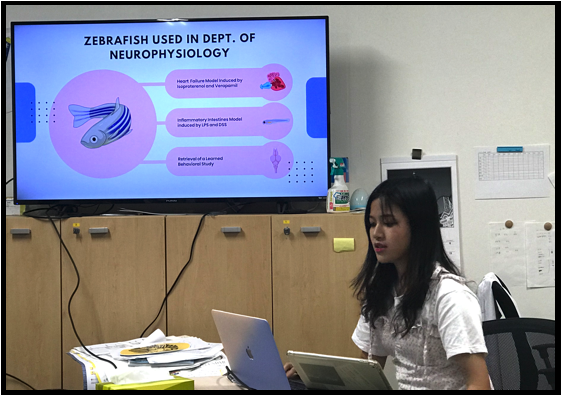 |
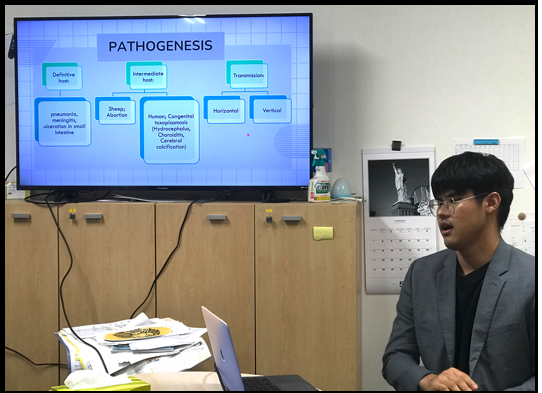 |
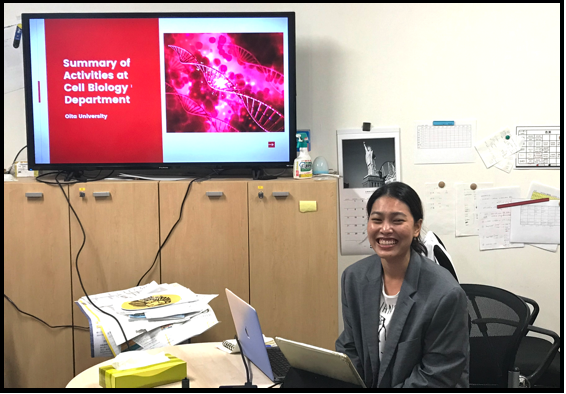 |
| June 7: Results (of a project) briefing. Mr. Pote, Ms. Bambam and Ms. Ing presented their data to their mentors, Dr. Surangkanang Chaiyasak and Dr. Kanissarinn Sakundech. | ||
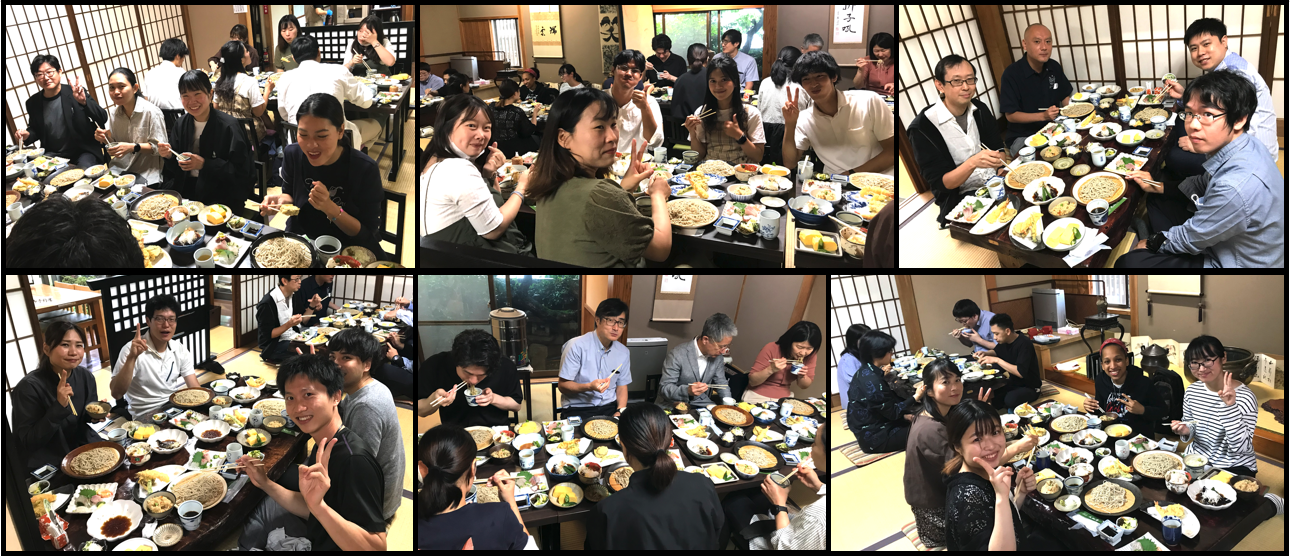 |
|
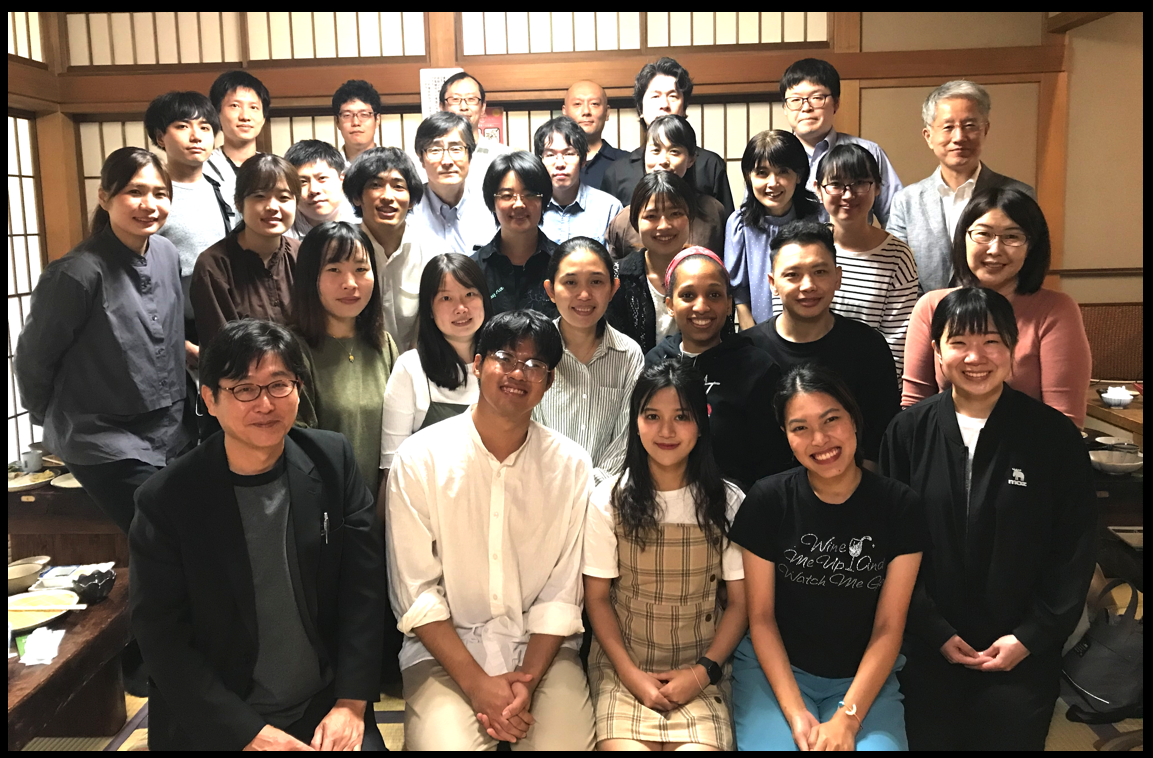 |
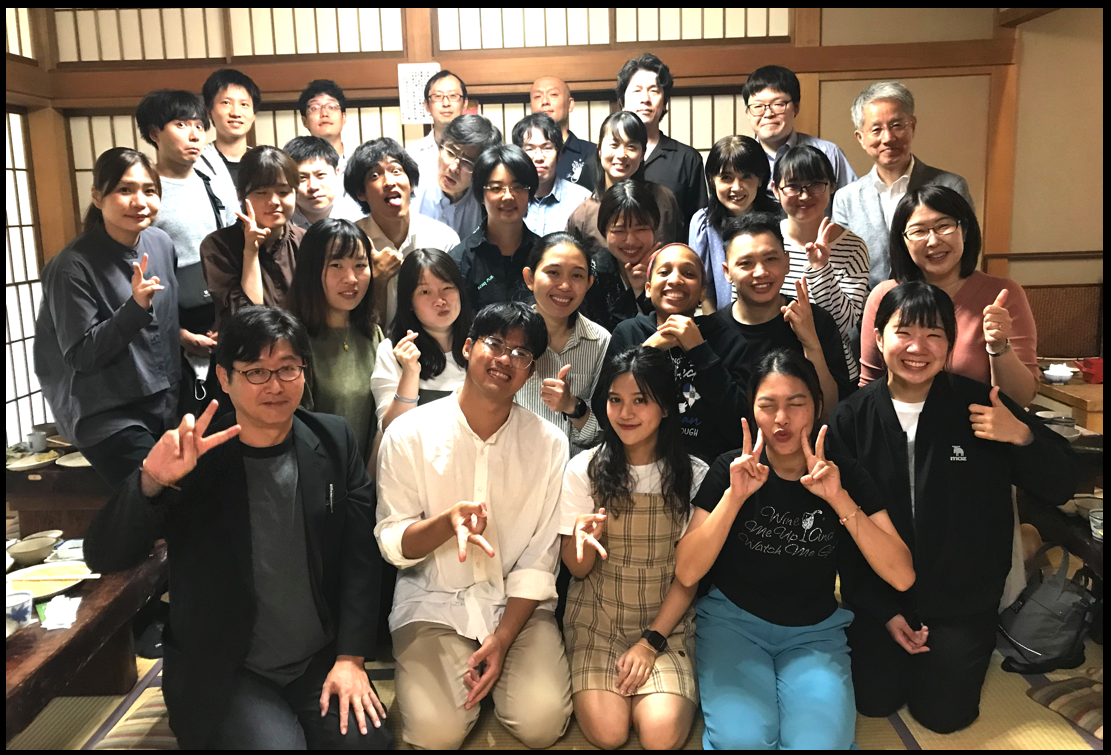 |
| June 8: Farewell lunch party at a soba restaurant, Tenchian. | |
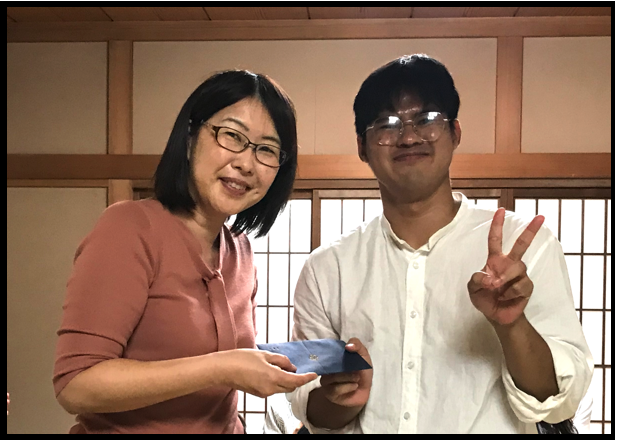 |
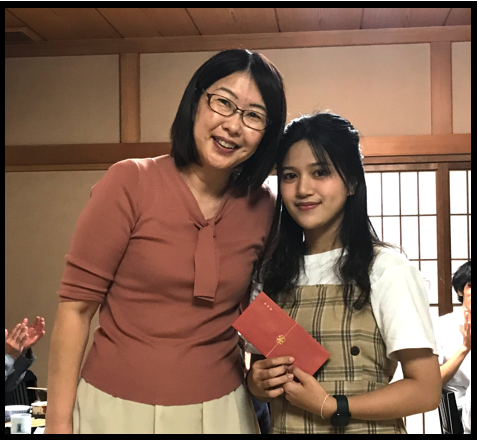 |
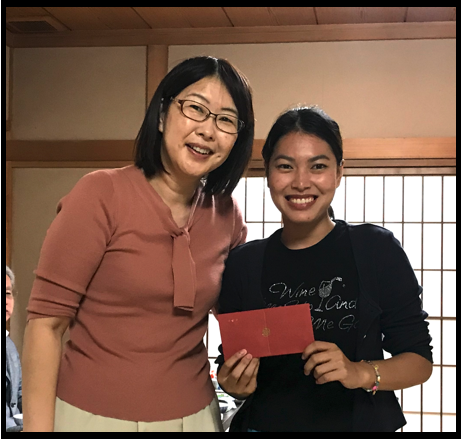 |
| June 8: Mr. Pote, Ms. Bambam and Ms. Ing were awarded the Study Abroad Encouragement Award by the Oita University Faculty of Medicine International Exchange Committee. The award was presented by Prof. Reiko Hanada, Chair of the committee. | ||
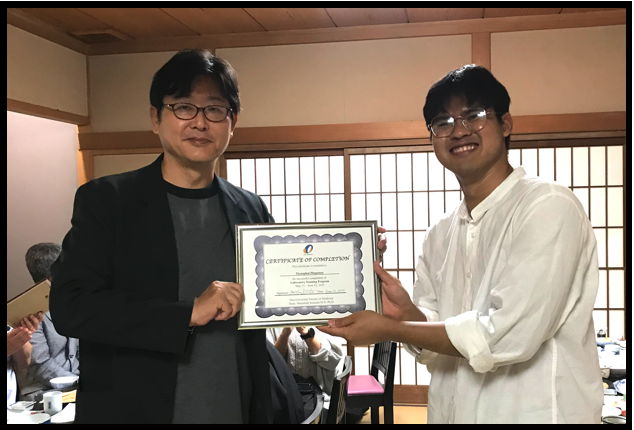 |
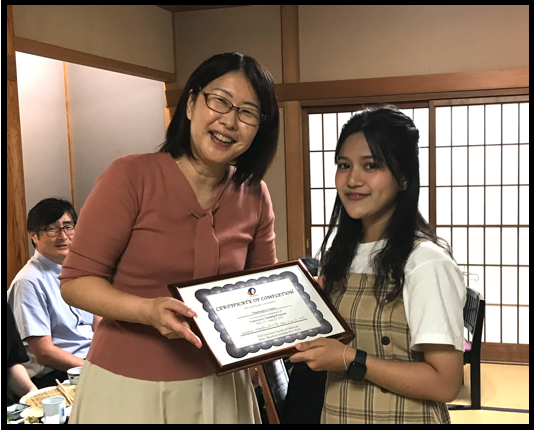 |
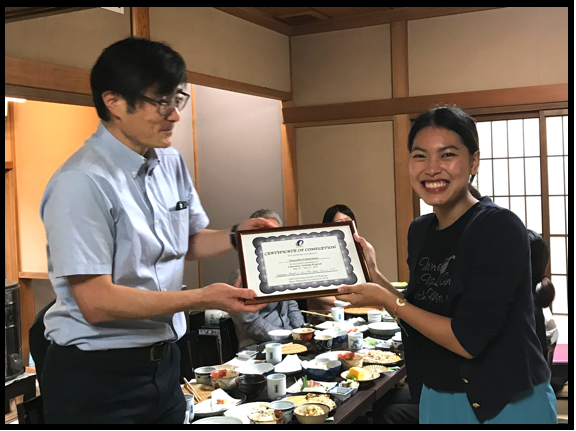 |
| June 8: They received a certificate of completion from their respective mentors. | ||
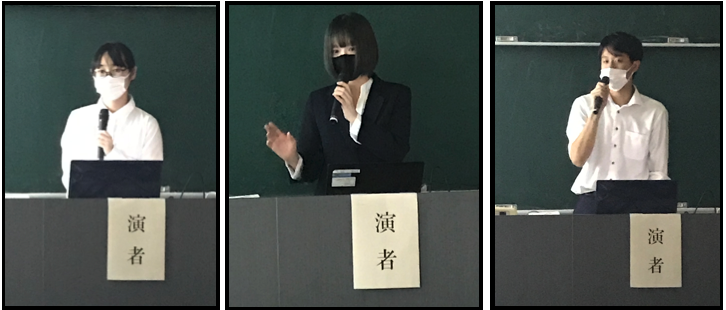 |
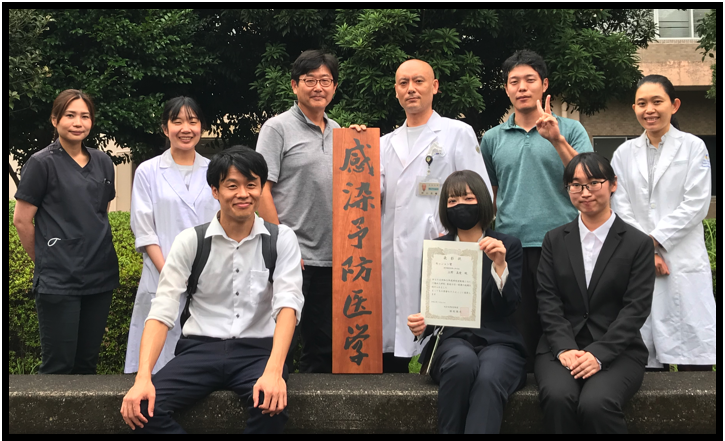 |
| July 20: Presentation. Everyone presented their data well and responded appropriately to questions. Ms Ueno was awarded a session prize! Congratulations!! | |
